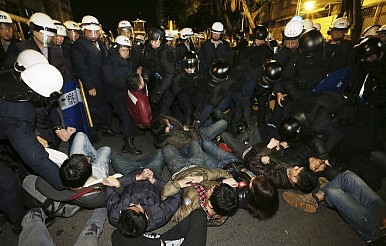外媒:國際應支持台灣的民主運動
2014年04月02日16:36
關注亞太地區時事的《外交官》雜誌,昨天以《台灣的民主戰爭》為題報導台灣的太陽花學運,呼籲國際支持循正當程序進行的台灣民主運動。
文中提及,中國外交部長王毅去年擔任國台辦主任時,曾在演說中透露中國的最終目標是透過兩岸互動最後完成統一,加上去年中國頒布東海防空識別區,不斷伸張在東海和南海的主權,呼籲全球應該關注中國對台灣的態度,以免跟克里米亞一樣遭到併吞。
文中提及馬英九政府和中國簽訂的服貿協定,讓人聯想到執意和俄羅斯簽約的烏克蘭前總統亞努科維奇,結果引爆人們上街反政府。台灣現在的社會運動,就是為了保護可能失去的民主,呼籲那些尊重民主價值的國家,開始關注台灣的學運,並且選擇站在對的一方。(陳怡妏/綜合外電報導)
文中提及,中國外交部長王毅去年擔任國台辦主任時,曾在演說中透露中國的最終目標是透過兩岸互動最後完成統一,加上去年中國頒布東海防空識別區,不斷伸張在東海和南海的主權,呼籲全球應該關注中國對台灣的態度,以免跟克里米亞一樣遭到併吞。
文中提及馬英九政府和中國簽訂的服貿協定,讓人聯想到執意和俄羅斯簽約的烏克蘭前總統亞努科維奇,結果引爆人們上街反政府。台灣現在的社會運動,就是為了保護可能失去的民主,呼籲那些尊重民主價值的國家,開始關注台灣的學運,並且選擇站在對的一方。(陳怡妏/綜合外電報導)
《外交官》以《台灣的民主戰爭》為題呼籲國際支持太陽花學運。翻攝網路
外媒評學運 挑戰北京統一大計
關注亞太地區時事的《外交官》雜誌副主編蒂耶茲(Shannon Tiezzi)近日就最近在台灣爆發的太陽花學運發表文章稱,這場運動可能為幾年來兩岸經濟上熱絡踩刹車,北京希望通過經濟和文化交往最終解決台灣問題的思路也需要重新思考。
內容指3月18日台灣學生運動開始後,國務院台辦發言人馬曉光間接發表了評論。馬曉光表示,兩岸服貿協議對兩岸合則兩利,並反駁服貿會導致台灣中小企業破產的說法。他同時指出,台灣社會上的一些疑慮是不存在的,比 如說中國勞工開放以後就可以大舉入台,這是協議裡沒有的,因為台灣至今包括在服貿協議裡都沒有開放中國勞工赴台工作。比如還有人說花4.8萬(人民幣)就可以投資移民台灣,服貿協議裡也是沒有的,台灣當局對中國的移民政策,只能是因為你發生了婚姻關係,大家知道陸配還有4到6年的等候期,所以不存在因為服貿協議,大陸就會去投資移民。所以,這些種種擔憂,如果大家能夠認真傾聽事實是可以得到化解的。
與此同時,中國輿論似乎並不支持台灣的太陽花學運。中國民眾對抗議者以暴徒般的心態所造成的過度破壞表達了震驚和沮喪。據《南華早報》報導,新浪微博發起的投票中,60%的投票者認為此舉是不理性及民粹主義的,其他人則認為,這是台灣暴躁式民主的典型作風,還有人將其與紅衛兵相提並論。還有中國民眾認為,北京應該收回服貿,而不是向台灣做出讓步。
自馬英九上台並承諾改善兩岸關係以來,胡錦濤和習近平都與台灣進行了戰略性的和平磋商,兩岸關係有所緩和,經貿交往增加。現在兩岸到了政治談判的端口,2月初,中國國台辦主任張志軍和台灣陸委會主委王郁琦的見面使兩岸民眾對於習馬會的可能性展開了聯想。
然而,現今的反服貿抗議可能為這段時期內的進展踩急刹車。抗議投射出台灣對與中國建立緊密聯繫的不安。即使服貿能在立法院通過,未來經濟或政治上的協議也會面臨困難。因此,即使馬英九願意繼續推動兩岸關係,可能也難於實施。
北京方面在密切觀察馬英九是否能處理好服貿協議。對中國來說,最終由海協會和海基會敲定的服貿協議,應該是已經商討完成的協議。而台灣抗議者希望逐條審議服貿協議(即事實上否定已經由海協會和海基會完成的談判),還希望能夠全部退回。如果民意能夠推翻北京和台北已經完成的談判,那麼中國會失去談判的意願。
對於北京來說,終極目標始終都是統一。撇開經濟因素不談,北京在兩岸上的每個舉動都是希望在政治上能對台灣更進一步。不管通過什麼方法來實施,目標都是不變的。然而,目前的局勢可能意味著北京希望通過經濟和文化統一的方法需要告一段落。如果真是這樣,北京需要重新思考統一大計。(國際中心/綜合外電報導)
內容指3月18日台灣學生運動開始後,國務院台辦發言人馬曉光間接發表了評論。馬曉光表示,兩岸服貿協議對兩岸合則兩利,並反駁服貿會導致台灣中小企業破產的說法。他同時指出,台灣社會上的一些疑慮是不存在的,比 如說中國勞工開放以後就可以大舉入台,這是協議裡沒有的,因為台灣至今包括在服貿協議裡都沒有開放中國勞工赴台工作。比如還有人說花4.8萬(人民幣)就可以投資移民台灣,服貿協議裡也是沒有的,台灣當局對中國的移民政策,只能是因為你發生了婚姻關係,大家知道陸配還有4到6年的等候期,所以不存在因為服貿協議,大陸就會去投資移民。所以,這些種種擔憂,如果大家能夠認真傾聽事實是可以得到化解的。
與此同時,中國輿論似乎並不支持台灣的太陽花學運。中國民眾對抗議者以暴徒般的心態所造成的過度破壞表達了震驚和沮喪。據《南華早報》報導,新浪微博發起的投票中,60%的投票者認為此舉是不理性及民粹主義的,其他人則認為,這是台灣暴躁式民主的典型作風,還有人將其與紅衛兵相提並論。還有中國民眾認為,北京應該收回服貿,而不是向台灣做出讓步。
自馬英九上台並承諾改善兩岸關係以來,胡錦濤和習近平都與台灣進行了戰略性的和平磋商,兩岸關係有所緩和,經貿交往增加。現在兩岸到了政治談判的端口,2月初,中國國台辦主任張志軍和台灣陸委會主委王郁琦的見面使兩岸民眾對於習馬會的可能性展開了聯想。
然而,現今的反服貿抗議可能為這段時期內的進展踩急刹車。抗議投射出台灣對與中國建立緊密聯繫的不安。即使服貿能在立法院通過,未來經濟或政治上的協議也會面臨困難。因此,即使馬英九願意繼續推動兩岸關係,可能也難於實施。
北京方面在密切觀察馬英九是否能處理好服貿協議。對中國來說,最終由海協會和海基會敲定的服貿協議,應該是已經商討完成的協議。而台灣抗議者希望逐條審議服貿協議(即事實上否定已經由海協會和海基會完成的談判),還希望能夠全部退回。如果民意能夠推翻北京和台北已經完成的談判,那麼中國會失去談判的意願。
對於北京來說,終極目標始終都是統一。撇開經濟因素不談,北京在兩岸上的每個舉動都是希望在政治上能對台灣更進一步。不管通過什麼方法來實施,目標都是不變的。然而,目前的局勢可能意味著北京希望通過經濟和文化統一的方法需要告一段落。如果真是這樣,北京需要重新思考統一大計。(國際中心/綜合外電報導)
《外交官》雜誌評太陽花學運。翻攝thediplomat



沒有留言:
張貼留言